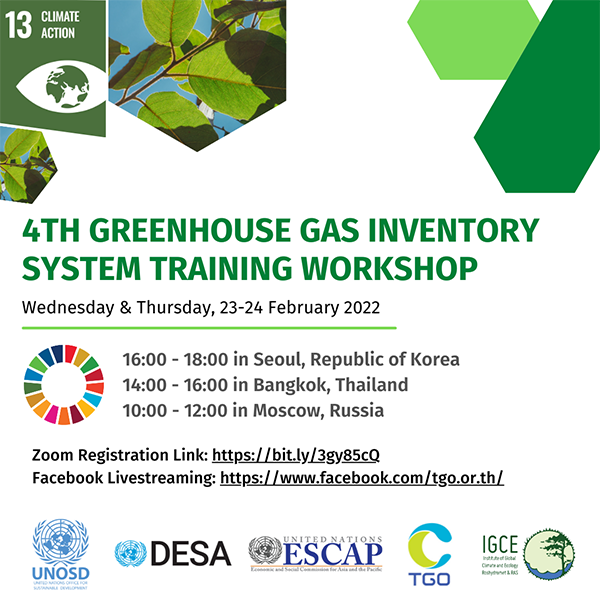[2022] 4th Greenhouse Gas Inventory System Training Workshop

Documents
CONCEPT NOTE & AGENDA (updated as of 27 February 2022)
SPEAKER'S BIOGRAPHY (updated as of 27 February 2022)
Recordings
Day 1 Recording: https://www.youtube.com/watch?v=nVZ-5vFP-po
Day 2 Recording: https://www.youtube.com/watch?v=NSUEzwYOkio
Background
Despite a current pandemic-related economic slowdown, the pace of climate change is clearly relentless. Countries across the globe continue to experience the increasing intensity and frequency of climate-related disasters such as extreme heat, floods, forest fires, droughts and storms. The world including Asia Pacific region remains far off track in meeting the Paris Agreement target of limiting global warming to 1.5°C above pre-industrial levels and reaching net-zero carbon dioxide emissions by 2050. As highlighted in the 2030 Agenda for Sustainable Development (A/RES/70/1), the Sustainable Development Goals are indivisible and interlinked. Achieving SDGs by 2030 heavily relies on addressing the climate crisis. Goal 13 of the 2030 Agenda specifically calls for urgent action to combat climate change and its impacts. As the world recovers from the pandemic, greenhouse gas emissions are expected to rise further unless critical steps are taken to shift economies towards carbon neutrality.
The initial step towards GHG emission reduction is the establishment of a transparent and reliable greenhouse gas inventory system. This allows countries to measure, report and verify the current state of emissions and make projections and future scenarios. It is also essential for understanding development trends, improving resource management and energy efficiency, and developing policies and methodologies to reach carbon neutrality. With the completion of the Paris Agreement Rulebook in the 2021 UNFCCC COP26 in Glasgow, the importance of national greenhouse gas inventory is becoming more prominent. Inventory is the basis of the transparency framework and is also essential for the fulfillment of reporting obligations under the Agreement.
The Paris Agreement eliminated the Kyoto Protocol’s dichotomous structure between developed and developing countries and consequently requires developing countries strengthened monitoring, reporting and verification. There is an urgent need to build capacity of government officials and experts to successfully implement the Paris Agreement and the SDGs. Within this framework, this year’s workshop is designed to share the up-to-date knowledge on climate change and its interlinkages to Sustainable Development and to provide introduction to the necessary skillsets and useful resources to estimate GHG emissions and build GHG inventories.
Objectives
The 4th Greenhouse Gas Inventory System Training Workshop aims to provide a platform for policy dialogue and capacity building for developing countries in Asia Pacific region on utilizing national GHG inventories for the implementation of SDG 13 and the Paris Agreement. The workshop is expected to have the following outcomes:
- Capacity development of target audience by raising awareness on climate change and its links to the 2030 Agenda and the SDGs, and urgent attention needed to carbon neutrality and climate ambition;
- Exchange of advanced knowledge and experiences of national governments in the Asia Pacific region on addressing climate emergency;
- Contribution to the establishment and advancement of greenhouse gas inventory systems in different countries by introducing methodologies for GHG emissions inventories and Paris Agreement reporting;
- Advancing networks among participating organizations, countries, and regions to promote the implementation of the SDGs and Climate Action.
Format, Date and Time
The workshop will be held from 23 to 24 February 2022 (approximately two hours per day) via Zoom. Please refer to the below time zones. The event will also be available through live streaming broadcast on TGO's Facebook page. The recordings will be uploaded to UNOSD’s Youtube channel.
- 16:00 - 18:00 in Seoul, Republic of Korea
- 14:00 - 16:00 in Bangkok, Thailand
- 10:00 - 12:00 in Moscow, Russia
Programme and Agenda
Day 1 (23 February 2022)
Opening Remarks:
- Mr. Chun Kyoo Park, Head of Office, UNOSD
- Ms. Katinka Weinberger, Chief, Environment and Development Policy Section, Environment and Development Division, UNESCAP
- Mr. Kiatchai Maitriwong, Executive Director, TGO
Main Session:
- IPCC 6th Assessment Report: about the Cycle, the Physical Science Basis, coming reports of WGII and WGIII
- Dr. Sergey M. Semenov, IPCC Vice-Chair, Scientific Director, Yu. A. Izrael Institute of Global Climate and Ecology (IGCE)
- Climate Indicators and Sustainable Development: Demonstrating the Interconnections
- Ms. Claire Ransom, Climate Monitoring and Policy, Services Division, World Meteorological Organization
- How can the Asia-Pacific region meet the 1.5°C target?
- Ms. Aneta Nikolova, Environmental Affairs Officer, Environment and Development Division, UNESCAP (Co-presented by Ms. Hannah Ryder of UNESCAP)
- Republic of Korea's Journey towards Carbon Neutrality
- Ms. Hye Won Choi, Deputy Director, Ministry of Environment of the Republic of Korea
Day 2 (24 February 2022)
Main Session:
- UNFCCC COP26: Key Outcomes
- Mr. Sergey Kononov, Manager, Transparency Division, UNFCCC Secretariat (Co-presented by Mr. Vitor Gois Ferreira of UNFCCC)
- Introduction to Methodologies for GHG emissions inventories and the Paris Agreement reporting
- Ms. Oksana Lipka, Project Leader, IGCE
- Dr. Alexander I. Nakhutin, Head of Department, IGCE, UNFCCC GHG Inventory Focal Point in the Russian Federation
- Dr. Veronika A. Ginzburg, Deputy Director, Head of Department, IGCE
Closing Remarks:
- Dr. Veronika A. Ginzburg, Deputy Director, Head of Department, IGCE
- Mr. Chun Kyoo Park, Head of Office, UNOSD
Organizers
This workshop will be organized by the United Nations Office for Sustainable Development (UNOSD), United Nations Economic and Social Commission for Asia and the Pacific (UNESCAP), Institute of Global Climate and Ecology (IGCE), and Thailand Greenhouse Gas Management Organization (TGO).
Target Audience
This workshop aims to engage government officials and representatives, and national institutions, particularly from the Asia-Pacific countries, concerned with development of national GHG inventory systems. It will also welcome non-government experts, academia, youth, and other interested stakeholders in the areas of SDG 13. Participants in this year’s online workshop will be given priorities to take part in the in-person training workshop scheduled in 2023.
Contact Information
Please contact Ms. Yujeong Kim at yujeong.kim@un.org and/or Mr. Huiyong Kim at hui.kim@un.org for any question related to the workshop

